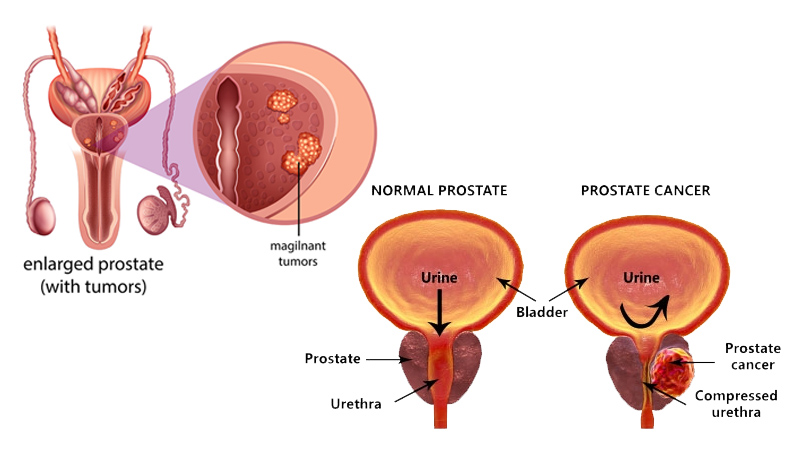Prostate Cancer Genomics
(AR, ATM, BARD1, BRCA1, BRCA2, BRIP1, CDK12, CHEK1, CHEK2, FANCL, FGFR2, FGFR3, PALB2, PTEN, RAD51B, RAD51C, RAD51D, RAD54L)
In metastatic prostate cancer, several mutations and therapeutic targets have been identified. Some of these include:

- Androgen receptor (AR) mutations: Mutations in the AR gene can lead to resistance to hormonal therapies, such as androgen deprivation therapy (ADT). These mutations can cause the AR to be constitutively active, allowing the cancer cells to continue growing even in the absence of Therapeutic strategies targeting AR mutations include next-generation anti-androgens, such as enzalutamide and abiraterone, which can inhibit AR signaling. Fusion genes (TMPRSS2–ERG) and transcription factors (FOXP1, NKX3.1) that promote tumour-cell pro- liferation and survival, and prostate- specific antigen (PSA) expression.
Novel hormonal agents targeting the AR pathway, either by inhibiting steroid synthesis (abiraterone) or by AR antagonists (enzalutamide, darolutamide, apalu- tamide), has extended the treatment options and significantly prolonged OS in metastatic hormone-sensitive PC, and non-metastatic and metastatic castration-resistant prostate cancer (CRPC). - DNA repair gene mutations: Mutations in DNA repair genes, such as BRCA1, BRCA2, and ATM, have been found in a subset of metastatic prostate These mutations impair the ability of cells to repair DNA damage, making them more susceptible to certain targeted therapies. Poly ADP-ribose polymerase (PARP) inhibitors, such as olaparib and rucaparib, have shown efficacy in treating prostate cancers with DNA repair gene mutations.
- PTEN loss: PTEN is a tumor suppressor gene that is frequently lost or mutated in prostate Loss of PTEN function can activate signaling pathways that promote cancer cell survival and growth. Therapies targeting the PI3K/AKT/mTOR pathway, such as mTOR inhibitors (e.g., everolimus) and PI3K inhibitors like buparlisib, are being investigated as potential treatments for prostate cancers with PTEN loss.
Loss of PTEN is seen in 15%-40% of PCs (depending on the detec- tion method) and can occur as a homozygous deletion in early disease. PTEN loss is associated with aggressive metastatic disease and other adverse outcomes. A phase III trial (NCT03072238) in mCRPC patients compared ipatasertib (AKT inhibitor) plus the novel AR-targeted agent abiraterone and prednisone, versus placebo plus abiraterone and pred- nisone. Results reported a significantly prolonged rPFS by immunohis- tochemistry in the population with tumour PTEN loss. - Neuroendocrine differentiation: In some cases of metastatic prostate cancer, the cancer cells may undergo neuroendocrine differentiation, leading to a more aggressive and treatment-resistant Therapeutic options for neuroendocrine prostate cancer include agents that target neuroendocrine markers, such as enzalutamide and platinum-based chemotherapy.
- Immunotherapies: Immune checkpoint inhibitors, such as pembrolizumab and nivolumab, have shown activity in a subset of CRPC patients with mismatch repair (MMR) deficiency or high tumor mutational burden (TMB). These drugs help unleash the body’s immune system to attack cancer
- Radiopharmaceuticals: Targeted radiopharmaceuticals, like radium-223 (Xofigo), can deliver radiation directly to bone metastases in CRPC, providing palliative benefit and potentially extending survival.
HRR (Homologous Recombination Repair) mutated cancers and BRCA (Breast Cancer) mutated cancers are related but distinct concepts. HRR mutated cancers refer to cancers that have mutations in genes involved in the homologous recombination repair pathway, which is responsible for repairing DNA double-strand breaks. These mutations can occur in various genes, such as BRCA1, BRCA2, RAD51, PALB2, and others. When these genes are mutated, the ability of cells to repair DNA damage is impaired, leading to an increased risk of developing cancer. HRR mutated cancers can occur in various types of tissues and are not limited to breast or ovarian cancers.